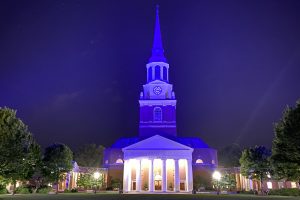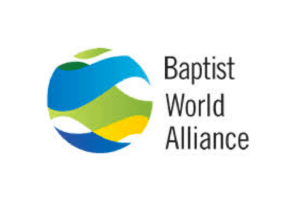In yet another sign of how church networks are replacing denominational identity, the Acts 29 network announced Jan. 11 that it will provide up to $50,000 apiece for new churches started through its sponsorship.
Leaders of Acts 29 insist it is not a denomination but a network focused on church planting. They describe their work as “a diverse, global community of healthy, multiplying churches characterized by theological clarity, cultural engagement and missional innovation.”
The nonprofit organization’s 2020 Annual Report said it includes 684 member churches, of which 483 are in the U.S. It also cited 132 “candidate churches and pastors” and 459 “applicant churches and pastors.” Churches that affiliate with Acts 29 must go through a screening process and signal their compatibility with the group’s doctrinal and missional visions. In 2020, Acts 29 claimed affiliated churches in 44 countries, including 25 new churches planted that year and 70 existing churches that joined the network.
“Theological clarity” as defined by Acts 29 is both Calvinist and complementarian.
“Theological clarity” as defined by Acts 29 is both Calvinist and complementarian. Among its five theological distinctives are “the sovereign grace of God in saving sinners,” a reference to predestination, and “the equality of men and women and the principle of male servant leadership,” a reference to the complementarian doctrine that men and women were created by God for different roles.
While Acts 29 does not claim to be a denomination and does not offer most of the trappings traditionally associated with denominations, it is building a cohesive identity that in some cases supersedes denominational identities. Participating congregations are often known as “Acts 29 churches.”
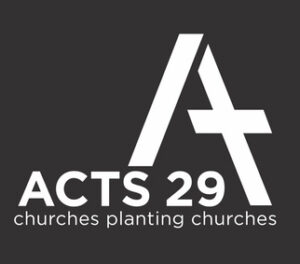 Many of its affiliated congregations are Southern Baptist, but many also are nondenominational or part of other Reformed traditions. For almost all, the Acts 29 affiliation equals or exceeds any denominational identity.
Many of its affiliated congregations are Southern Baptist, but many also are nondenominational or part of other Reformed traditions. For almost all, the Acts 29 affiliation equals or exceeds any denominational identity.
Thus, as a church-planting ministry, the group exists to create more churches like itself. And the new financial incentives are viewed as a significant advance toward that goal.
Because Acts 29 is classified by the IRS as a “church” and not just a charity or a nonprofit, it is not required to publish its financial statements. Other nonprofits are required by law to report basic income and expenses to the IRS on Form 990, but “churches” are not required to do so. Thus, the sources of income and amounts of income flowing to Acts 29 — as well as its annual expenditures — are not publicly known.
When the group announced its new $25,000-per-year incentive for qualified church starts (that may be renewed for a second year), no indication was given as to how many grants would be made or where the money is coming from. A reporter for Baptist News Global has been promised an interview with an Acts 29 official, but that official has not yet been made available.
Why this matters
From World War II through the end of the 20th century, most church starting in the United States was coordinated by denominational bodies. All Protestant denominations created plans and offered resources to begin congregations, often intentionally targeting new communities where rapid growth was likely.
Southern Baptists were chief among the denominational groups aggressively supporting new churches. For decades, this was a collaborative effort between the Southern Baptist Convention, state Baptist conventions and local Baptist associations.
 In a typical scenario, the SBC and a state convention might strategize on where new congregations would be needed and then enlist local associations and a few sponsoring congregations in partnership on the effort. For example, as new subdivisions sprang up in major metro areas, an existing church might “sponsor” a church start with financial help from the association, the state convention and the SBC.
In a typical scenario, the SBC and a state convention might strategize on where new congregations would be needed and then enlist local associations and a few sponsoring congregations in partnership on the effort. For example, as new subdivisions sprang up in major metro areas, an existing church might “sponsor” a church start with financial help from the association, the state convention and the SBC.
Thousands of Baptist churches in America began this way in the 20th century. Within the last decade, however, the SBC’s North American Mission Board — which has responsibility for SBC church planting — unilaterally changed its methodology to eliminate the role of most state Baptist conventions and local associations and instead works on its own.
This move has generated intense controversy internally, but it also mirrors a trend church historians and demographers have predicted for 30 years: the rise of a post-denominational age where affinity networks take priority over denominations.
Acts 29 is one such network.
While there are no formal ties between the SBC and Acts 29, there are many informal ties through pastors and congregations and Acts 29 staff members who are Southern Baptist. However, the extent of those connections also is hard to quantify because NAMB in recent years has become one of the most secretive of denominational entities. It, too, is classified as a “church” by the IRS and does not have to publish its financials.
NAMB and the SBC’s church planting
Unlike Acts 29, though, NAMB does have to report its financials in the SBC Annual, published each year in conjunction with the SBC annual meeting. The 2021 Annual shows that in 2020, NAMB spent $69 million on church planting, thus exceeding its stated goal of allocating half of all expenditures on church planting. (Total NAMB expenditures for the year were $124 million.)
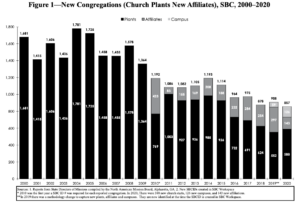 What that $69 million expended on church planting actually achieved is not transparent because neither NAMB nor the SBC report specific details on church starting or church starters — a fairly recent change. Also not known is how many or what percentage of NAMB’s church planters are Calvinists, a growing segment within the denomination over the past 20 years but still a controversial theology to many traditional Southern Baptists.
What that $69 million expended on church planting actually achieved is not transparent because neither NAMB nor the SBC report specific details on church starting or church starters — a fairly recent change. Also not known is how many or what percentage of NAMB’s church planters are Calvinists, a growing segment within the denomination over the past 20 years but still a controversial theology to many traditional Southern Baptists.
In the SBC’s 2021 Book of Reports, NAMB reported that in 2020, “237 individuals went through a Send Network assessment retreat (held virtually due to COVID-19), with 85% of those approved to move toward planting a church.” Send Network is the name of the church-planting program.
Also, NAMB reported: “Send Network Orientation, which is usually in-person for a period of several days, was held virtually in 2020, with more than 325 attending. During orientation, newly endorsed planters are informed of the vision and mission of the Send Network and equipped to embody the network’s shared values of family, multiplication and restoration.”
In May 2021, NAMB reported starting 588 new churches in 2020, what it said was an increase of 36 over the previous year. NAMB also reported in December 2021 that among the 2021 Outreach Magazine list of top 100 reproducing churches at least a quarter were Southern Baptist churches.
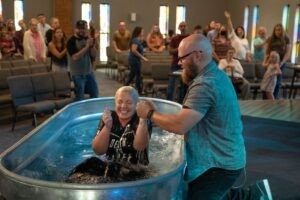
Noah Oldham baptizes a believer during a church service at August Gate Church in St. Louis where Oldham serves as pastor. Oldham is also the senior director of church planter deployment for the SBC North American Mission Board. (NAMB)
NAMB’s current goals call for 5,000 new congregations in the SBC by the end of 2025, including 600 church plants annually, 200 replants, 100 new campuses and 350 new affiliations. However, the annual reports on SBC congregations continue to show declines in membership and numbers of congregations. Even though NAMB today spends twice the amount of money on church planting than it did a decade ago, it is beginning about half the number of new congregations it did a decade ago.
State convention executives and other pastors and lay leaders have been highly critical of NAMB and its finances. Had other even more controversial issues — responding to a sexual abuse scandal and battling against Critical Race Theory and abortion — not taken up so much business time at the SBC annual meeting last June, it is likely there would have been more demand for answers from NAMB.
Acts 29 and the SBC
Here, then, is where the offer of a $50,000 incentive to potential church planters from Acts 29 comes into sharp relief. No one outside NAMB knows what NAMB is paying its church planters. And it also is not clear whether someone being payed by NAMB to start a church would be allowed to take money from Acts 29 — or vice versa.
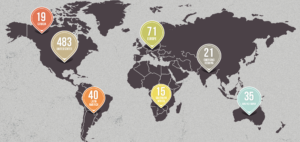
2020 graphic showing locations of Acts 29 churches
In an FAQ section on the Acts 29 website, this question is asked: “What if I am already affiliated with another denomination or organization?” The answer given: “Acts 29 has a single focus: church planting. Acts 29 is not a denomination. We are therefore open to dual-affiliation but ask that you inform the organizations that you are already affiliated with about your desire to join Acts 29.”
If NAMB-supported church planters wanted to — and were allowed to — align not only with the SBC but also with Acts 29, they likely could double their money but also would have to embrace the Calvinist theology of the Acts 29 movement.
By some published accounts, NAMB operates on a sliding scale that offers financial support ranging from $500 to $15,000 per month for up to four years. But NAMB officials previously have declined to give details of these expenditures.
NAMB funds also have been used to purchase more than 100 pieces of real estate in targeted areas, purportedly providing housing for a rotating cast of church planters and their families assigned to those areas. Previous BNG reporting also noted the frequent use of gift cards as incentives to church planters and their family members.
Meanwhile, some NAMB critics, upon hearing news of the relatively large financial incentive from Acts 29, began to question whether any of that money is coming from NAMB. A spokesperson for the public relations firm representing Acts 29 told a BNG reporter that “NAMB does not have involvement with this initiative.”
A spokesperson for the public relations firm representing Acts 29 told a BNG reporter that “NAMB does not have involvement with this initiative.”
The reason some might reasonably be curious is that there are overlaps in congregations, pastors and leadership between the SBC and Acts 29. Some of those are visible, but many others are not on open display. Yet Acts 29 churches and SBC church planters often swim in the same circles.
What and who is Acts 29?
Acts 29 takes its name from the fact that the New Testament book of Acts has 28 chapters. Thus, Acts 29 represents what comes next.
The organization’s co-founder was Mark Driscoll, then pastor of Mars Hill Church in Seattle, a firebrand young Calvinist known for advocating hypermasculinity and authoritarian leadership. In 2014, Acts 29 removed Driscoll and Mars Hill from its membership amid accusations of abuse of people and funds.
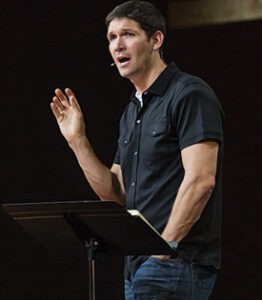
Matt Chandler
The organization’s current board president is Matt Chandler, pastor of a nominally Baptist megachurch in the far northern suburbs of Dallas. His congregation, Village Church, began life as Highland Village First Baptist Church but changed its name in 2002 when Chandler became pastor. Chandler is a highly influential leader among Calvinist pastors in particular and has a broad following in the SBC.
“We have always believed that the local church is God’s primary mission strategy here on earth,” Chandler said in a news release about the new funding. “This initiative will leverage our network resources to come alongside church planters bringing the gospel to new places with the resources they need to create thriving, healthy churches. There are a number of incredible and unique challenges a church planter faces in their role, and we want Acts 29 to be a community with knowledge, experience, and resources to help overcome those challenges.”
The organization’s executive director is Brian Howard, an entrepreneur and church starter who also serves as vice president of Pacific Church Network, which is part of the Conservative Baptist Association of Southern California.
“We are proud to announce this initiative for new church plants and are thrilled that Acts 29 has the ability to empower leaders and churches in doing the good work we have been called by God to do — make the gospel known throughout the world,” Howard added. “So many churches have been hit hard by the pandemic. Through this initiative, church leaders and their teams will be better equipped as they prepare, launch, and sustain healthy, multiplying churches.”
Although not a denomination, Acts 29 lists a staff of 57 people.
Together, Acts 29 and the SBC are among the most aggressive bodies starting Protestant Christian congregations in America today. The process, calling and funding to start congregations have proved increasingly difficult for all denominational bodies.
Thus Lifeway Research reported that in 2019, about 3,000 Protestant churches were started in the U.S., but 4,500 Protestant churches closed, creating a net deficit of 1,500 congregations.
Related articles:
How one Vietnamese convert sparked a church-planting movement that defied the odds











